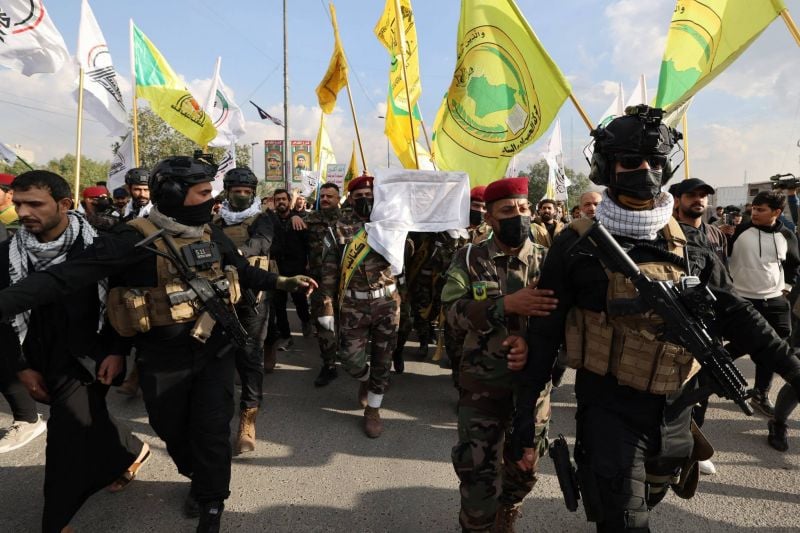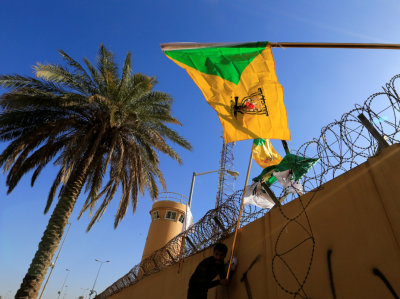
Members of Hashed al-Shaabi (Popular Mobilisation) forces carry the coffin of a comrade, who died in American air strikes targeting Iran-backed groups the day before, during his funeral at the Hashed al-Shaabi forces' headquarters in Baghdad on Jan. 25, 2024. (Credit: Ahmad al-Rubaye/AFP)
Pro-Iranian Iraqi armed group Kataib Hezbollah announced on Tuesday the suspension of all its military operations against US troops in the region, in a decision aimed at preventing "embarrassment" to the Iraqi government. The decision followed the killing of three US troops in a drone attack last Sunday near the Jordan-Syria border — an attack that the Pentagon said bore the "footprints" of Kataib Hezbollah.
But, what is Kataib Hezbollah? L'Orient Today sums it up.
Who is this group?
The group, founded in the aftermath of the 2003 US-led invasion of Iraq, is one of the elite Iraqi armed factions closest to Iran. Kataib Hezbollah coalesced in 2005-2007 from "special groups" operated by the Quds Force — a branch of the Iranian Revolutionary Guard Corps — according to the Washington Institute think tank.
Iraqi officials and members of the group say that Kataib Hezbollah has thousands of fighters and an arsenal of drones, rockets, and short-range ballistic missiles. It is the most powerful armed faction in the Islamic Resistance in Iraq, an umbrella group of hardline Shi'ite armed groups that have claimed more than 150 attacks on US forces since the Gaza war began.
According to the Washington Institute, the group is subordinate to and partly financed by the Quds Force. The think tank also claimed that Kataib Hezbollah carries out specific actions under Quds Force's instructions, direction, or control. Kataib Hezbollah is governed by a Shura Council with a secretary-general, five deputies, and at least thirty-three total members, plus external “overseers” from the Quds Force and Lebanese Hezbollah.
The group constitutes several battalions in Iraq's Popular Mobilization Forces (PMF), a coalition of armed factions originally created to fight Islamic State in 2014 that was then recognized as an official security force. Kataib Hezbollah members, including some designated as terrorists by the US, hold senior positions in the PMF.
While it is technically under the command of Iraq's prime minister as part of the PMF, the group often operates outside the chain of command and has defied and challenged government statements calling for an end to attacks on US forces. Kataib Hezbollah views US troops in Iraq as foreign occupiers and has repeatedly called for their forceful expulsion.
A glimpse into the group's history
Dual Iraqi-Iranian citizen Abu Mahdi al-Muhandis was the leader of Kataib Hezbollah until he was killed in a US drone strike in 2020 along with Iranian Quds Force commander Qassem Soleimani at Baghdad International Airport.
In 2009, the US designated it as a terrorist organization.
Following the outset of the Syrian civil war a few years later, the group fought alongside other Shi'ite militias against mostly Sunni rebels and has continued to operate in Syria ever since.
Over the years, the US has struck Kataib Hezbollah positions, bases, and training and logistics hubs several times.
On the political front — though it does not publicly confirm or deny its relationship— the group is widely seen to have fielded a political party for the first time in 2021 elections, winning several seats in parliament.
